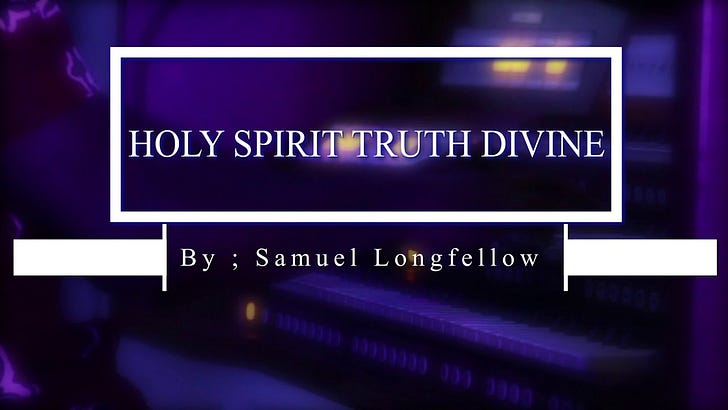In the Aeneid, when the Sibyl is about to be possessed by the god Apollo so that she can do her work as a soothsayer, it’s as if she’s being invaded by an alien that almost shakes her body to pieces. But in Scripture, we find that the Spirit of God is often so gentle that most people will not hear Him. The prophet Elijah sought for God in the tempest and the earthquake and the whirlwind, but He was in none of those mighty things. No, Elijah heard him in the “still small voice,” a gentle whispering sound, a breeze. It may have been like the “cool of the evening” in Genesis, when the Lord God walked in Eden – literally, the breath of the evening.
For the Holy Spirit, says Jesus, is the Consoler. He makes us strong by giving us peace, easing our fears, building us up in trust and resolution. Where the Spirit comes, discord melts away. It doesn’t mean that we won’t suffer. But when the Spirit revealed to that guilty man on the Cross who the man crucified beside him really was, his words are not those of bitterness or despair. Even in the midst of pain he says, “Lord, let me be with you when you enter into your kingdom.” The body may be racked with pain, like the surface of a lake tossed by a storm, when just below, where the life dwells, all is still, all is as it should be.
That is why I love this hymn of petition, “Holy Spirit, Truth Divine,” written by Samuel Longfellow, the youngest brother of the famous poet Henry Wadsworth Longfellow. Don’t ask me how a Unitarian minister can invoke the Third Person of the Trinity – perhaps he thought of the Holy Spirit as a created emanation from God. Nevertheless, the poem is very fine, and can be sung by any orthodox Christian. In each of the six simple stanzas, Longfellow invokes the Spirit by one of His attributes: Light, Love, Power, Right, Peace, and Joy. And as you will notice, each stanza is a meditation on what that attribute means for the soul the Spirit enters. That can sound abstract, but in the hands of a skilled poet, it is not so at all. Take the first stanza, for instance. Longfellow beseeches the Spirit, as Truth, to “dawn upon this soul of mine,” and we are meant to think of the very beginning of creation, when God said, “Let there be light,” and there was light. This breath of God is the “inward Light,” and we may well think of Adam, asleep in non-being, when God breathed into him and he became a living soul. Without the Spirit, we are not awake, and we do not see.
Or look at the second stanza, when Longfellow calls upon the Spirit as “Love divine,” and here we may think of Pentecost, when the Holy Spirit descended upon the apostles as in tongues of flame. What does fire do? It gives light, and it burns. So this fire shall “glow within this heart of mine,” to transform that heart, kindling “every high desire,” and purging the heart too, as the poet ends the stanza with a bold and remarkable request, “Perish self in thy pure fire!” For it is as Jesus says, that he who would save his life must lose it, and we become most ourselves when we give ourselves over completely to God. And that too is the implicit meaning of each of Longfellow’s prayers. The first line always names the Spirit, and ends with the word “divine,” and the second line always begs the Spirit to do something transformative to the soul or heart or will “of mine.” Nothing in me is of itself divine, and everything that is merely mine is weak or sad or restless.
The only exception comes in the fourth stanza, where the Spirit, invoked as “Right divine,” is to enter and rule absolutely within the poet’s conscience: “King within my conscience reign.” Here it is as if there is nothing at all left to the poet, nothing of “mine,” and yet that means that the poet gains all indeed: “Be my law,” he says, “and I shall be / Firmly bound, forever free.”
This hymn is sung to many a lovely melody. We’ve found one superb and sweet rendition we hope you will enjoy.
Holy Spirit, Truth divine, Dawn upon this soul of mine. Breath of God, and inward Light, Wake my spirit, clear my sight. Holy Spirit, Love divine, Glow within this heart of mine. Kindle every high desire, Perish self in thy pure fire! Holy Spirit, Power divine, Fill and nerve this will of mine. By thee may I strongly live, Bravely bear, and nobly strive. Holy Spirit, Right divine, King within my conscience reign; Be my law, and I shall be Firmly bound, forever free. Holy Spirit, Peace divine, Still this restless heart of mine. Speak to calm this tossing sea, Stayed in thy tranquility. Holy Spirit, Joy divine, Gladden thou this heart of mine: In the desert ways I sing, "Spring, O Well, forever spring!"




This is a very fine hymn regarding structure as well as message. Thank you for sharing. I have spent the whole morning trying to run down the tune. It reminds me of the hymn tune MERCY, but is not. Does anyone know?
Regarding Longfellow's theology, we can be thankful that God uses crooked sticks to draw straight lines. We all are.